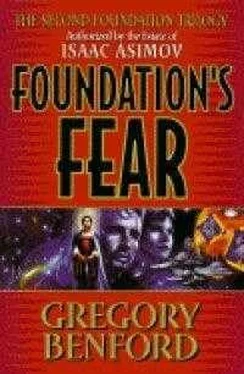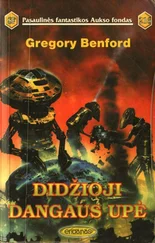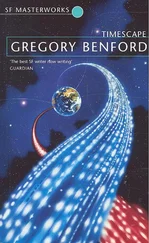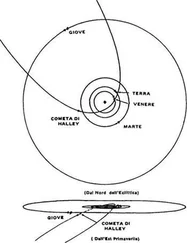Gregory Benford - Foundation’s Fear
Здесь есть возможность читать онлайн «Gregory Benford - Foundation’s Fear» весь текст электронной книги совершенно бесплатно (целиком полную версию без сокращений). В некоторых случаях можно слушать аудио, скачать через торрент в формате fb2 и присутствует краткое содержание. Год выпуска: 1997, ISBN: 1997, Издательство: Orbit, Жанр: Фантастика и фэнтези, на английском языке. Описание произведения, (предисловие) а так же отзывы посетителей доступны на портале библиотеки ЛибКат.
- Название:Foundation’s Fear
- Автор:
- Издательство:Orbit
- Жанр:
- Год:1997
- ISBN:ISBN: 0-06-105243-4
- Рейтинг книги:4 / 5. Голосов: 1
-
Избранное:Добавить в избранное
- Отзывы:
-
Ваша оценка:
- 80
- 1
- 2
- 3
- 4
- 5
Foundation’s Fear: краткое содержание, описание и аннотация
Предлагаем к чтению аннотацию, описание, краткое содержание или предисловие (зависит от того, что написал сам автор книги «Foundation’s Fear»). Если вы не нашли необходимую информацию о книге — напишите в комментариях, мы постараемся отыскать её.
Foundation’s Fear — читать онлайн бесплатно полную книгу (весь текст) целиком
Ниже представлен текст книги, разбитый по страницам. Система сохранения места последней прочитанной страницы, позволяет с удобством читать онлайн бесплатно книгу «Foundation’s Fear», без необходимости каждый раз заново искать на чём Вы остановились. Поставьте закладку, и сможете в любой момент перейти на страницу, на которой закончили чтение.
Интервал:
Закладка:
Yugo frowned. “I was thinkin’ it was, well, that we needed more data.”
Hari felt the old, familiar frustration. “No, I can feel it. There’s something crucial, and we don’t have it.”
Yugo looked doubtful and then their off-disk came. They changed through a concentric set of circulating slideways, reducing their velocity and ending in a broad square. An impressive edifice dominated the high air shafts, slender columns blooming into offices above. Sunlight trickled down the sculpted faces of the building, telling tales of money: Artifice Associates.
Reception whisked them into a sanctum more luxurious than anything at Streeling. “Great room,” Yugo said with a wry slant of his head.
Hari understood this common academic reflection. Technical workers outside the university system earned more and worked in generally better surroundings. None of that had ever bothered him. The idea of universities as a high citadel had withered as the Empire declined, and he saw no need for opulence, particularly under an Emperor with a taste for it.
The staff of Artifice Associates referred to themselves as A2and seemed quite bright. He let Yugo carry the conversation as they sat around a big, polished pseudowood table; he still pulsed with the zest of the earlier violence. Hari sat back and meditated on his surroundings, his mind returning as always to new facets which might bear upon psychohistory.
The theory already had mathematical relationships between technology, capital accumulation, and labor, but the most important driver proved to be knowledge. About half the economic growth came from the increase in the quality of information, as embodied in better machines and improved skills, building efficiency.
Fair enough-and that was where the Empire had faltered. The innovative thrust of the sciences had slowly ground down. The Imperial Universities produced fine engineers, but no inventors. Great scholars, but few true scientists. That factored into the other tides of time.
Only independent businesses such as this, he reflected, continued the momentum which had driven the entire Empire for so long. But they were wildflowers, often crushed beneath the boot of Imperial politics and inertia.
“Dr. Seldon?” a voice asked at his elbow, startling Hari out of his rumination. He nodded.
“We do have your permission as well?”
“Ah, to do what?”
“To use these.” Yugo stood and lifted onto the table his two carry-cases. He unzipped them and two ferrite cores stood revealed.
“The Sark sims, gentlemen.”
Hari gaped. “I thought Dors-”
“Smashed ‘em? She thought so, too. I used two old, worthless data-cores in your office that day.”
“You knew she would-”
“I gotta respect that lady-quick and strong-minded, she is.” Yugo shrugged. “I figured she might get a little…provoked.”
Hari smiled. Suddenly he knew that he had been repressing real anger at Dors for her high-handed act. Now he released it in a fit of hearty laughter. “Wonderful! Wife or not, there are limits.”
He howled so hard tears sprang to his eyes. The guffaws spread around the table and Hari felt better than he had in weeks. For a moment all the nagging University details, the ministership, everything-fell away.
“Then we do have your permission, Dr. Seldon? To use the sims?” a young man at his elbow asked again.
“Of course, though I will want to keep close tabs on some, ah, research interests of mine. Will that be possible Mr…?”
“Marq Hofti. We’d be honored, sir, if you could spare the project some time. I’ll do my best-”
“And I.” A young woman stood at his other elbow. “Sybyl,” she said, and shook hands. They both appeared quite competent, neat, and efficient. Hari puzzled at the looks bordering on reverence they gave him. After all, he was just a mathist, like them.
Then he laughed again, heartily, a curiously liberating bark. He had just thought of what it would be like to tell Dors about the data-cores.
Part 2. The Rose Meets The Scalpel
Computational representation-…it is clear that, except for occasional outbursts, the taboos against advanced, artificial intelligences head throughout the Empire through the great sweep of historical time. This uniformity of cultural opinion probably reflects tragedies and traumas with artificial forms far back in pre-Empire ages. There are records of early transgressions by self-aware programs, including those by “sims,” or self-organizing simulations. Apparently the preancients enjoyed recreating personalities of their own past, perhaps for instruction or amusement or even research. None of these are known to survive, but tales persist that they were once a high art.
Of darker implication are the narratives which hypothesize self-aware intelligences lodged in bodies resembling human. While low-order mechanical forms are customarily allowed throughout the Empire, these “tiktoks” constitute no competition with humans, since they perform only simple and often disagreeable tasks…
—Encyclopedia Galactica1.
Joan of Arc wakened inside an amber dream. Cool breezes caressed her, odd noises reverberated. She heard before she saw
—and abruptly found herself sitting outdoors. She noted things one at a time, as though some part of herself were counting them.
Soft air. Before her, a smooth round table.
Pressing against her, an unsettling white chair. Its seat, unlike those in her home village of Domremy, was not hand-hewn of wood. Its smooth slickness lewdly aped her contours. She reddened.
Strangers. One, two, three…winking into being before her eyes.
They moved. Peculiar people. She could not tell woman from man, except for those whose pantaloons and tunics outlined their intimate parts. The spectacle was even more than she’d seen in Chinon, at the lewd court of the Great and True King.
Talk. The strangers seemed oblivious of her, though she could hear them chattering in the background as distinctly as she sometimes heard her voices. She listened only long enough to conclude that what they said, having nothing to do with holiness or France, was clearly not worth hearing.
Noise. From outside. An iron river of self-moving carriages muttered by. She felt surprise at this-then somehow the emotion evaporated.
A long view, telescoping in
Pearly mists concealed distant ivory spires. Fog made them seem like melting churches.
What was this place?
A vision, perhaps related to her beloved voices. Could such apparitions be holy?
Surely the man at a nearby table was no angel. He was eating scrambled eggs-through a straw.
And the women-unchaste, flagrant, gaudy cornucopias of hip and thigh and breast. Some drank red wine from transparent goblets, different from any she’d seen at the royal court.
Others seemed to sup from floating clouds-delicate, billowing mousse fogs. One mist, reeking of beef with a tangy Loire sauce, passed near her. She breathed in-and felt in an instant that she had experienced a meal.
Was this heaven? Where appetites were satisfied without labor and toil?
But no. Surely the final reward was not so, so… carnal. And perturbing. And embarrassing.
The fire some sucked into their mouths from little reeds-those alarmed her. A cloud of smoke drifting her way flushed birds of panic from her breast-although she could not smell the smoke, nor did it burn her eyes or sear her throat.
The fire, the fire! she thought, heart fluttering in panic. What had… .?
She saw a being made of breastplate coming at her with a tray of food and drink -poison from enemies, no doubt, the foes of France! she thought in churning fright-she at once reached for her sword.
Читать дальшеИнтервал:
Закладка:
Похожие книги на «Foundation’s Fear»
Представляем Вашему вниманию похожие книги на «Foundation’s Fear» списком для выбора. Мы отобрали схожую по названию и смыслу литературу в надежде предоставить читателям больше вариантов отыскать новые, интересные, ещё непрочитанные произведения.
Обсуждение, отзывы о книге «Foundation’s Fear» и просто собственные мнения читателей. Оставьте ваши комментарии, напишите, что Вы думаете о произведении, его смысле или главных героях. Укажите что конкретно понравилось, а что нет, и почему Вы так считаете.












